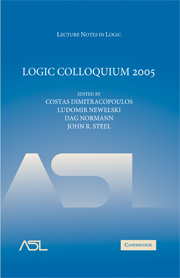Book contents
- Frontmatter
- Contents
- Introduction
- Speakers and Titles
- Thread algebra and risk assessment services
- Covering definable manifolds by open definable subsets
- Isomorphisms and definable relations on computable models
- Independence for types in algebraically closed valued fields
- Simple groups of finite Morley rank
- Towards a logic of type-free modality and truth
- Structural analysis of Aronszajn trees
- Proof analysis in non-classical logics
- Paul Bernays' later philosophy of mathematics
- Proofnets for S5: Sequents and circuits for modal logic
- Recursion on the partial continuous functionals
- A transactional approach to the logic of truth
- On some problems in computable topology
- Monotone inductive definitions and consistency of New Foundations
- LECTURE NOTES IN LOGIC
Introduction
Published online by Cambridge University Press: 18 December 2009
- Frontmatter
- Contents
- Introduction
- Speakers and Titles
- Thread algebra and risk assessment services
- Covering definable manifolds by open definable subsets
- Isomorphisms and definable relations on computable models
- Independence for types in algebraically closed valued fields
- Simple groups of finite Morley rank
- Towards a logic of type-free modality and truth
- Structural analysis of Aronszajn trees
- Proof analysis in non-classical logics
- Paul Bernays' later philosophy of mathematics
- Proofnets for S5: Sequents and circuits for modal logic
- Recursion on the partial continuous functionals
- A transactional approach to the logic of truth
- On some problems in computable topology
- Monotone inductive definitions and consistency of New Foundations
- LECTURE NOTES IN LOGIC
Summary
The 2005 European Summer Meeting of the Association for Symbolic Logic was held in Athens, Greece, July 28–August 3, 2005. The meeting was called Logic Colloquium 2005 and its sessions, except the opening one, which took place in the Main Building, took place in the building of the Department of Mathematics of the University of Athens. It was attended by 198 participants (and 25 accompanying persons) from 29 different countries. The organizing body was the Inter-Departmental Graduate Program in Logic and Algorithms (MPLA) of the University of Athens, the National Technical University of Athens and the University of Patras. Financial support was provided by the Association for Symbolic Logic, the Athens Chamber of Commerce and Industry, the Bank of Greece, the Graduate Program in Logic and Algorithms, IVI Loutraki Water Co., the Hellenic Parliament, Katoptro Publications, Kleos S. A., the Ministry of National Education and Religious Affairs, Mythos Beer Co., the National and Kapodistrian University of Athens, the National Bank of Greece and Sigalas Wine Co.
The Program Committee consisted of Chi Tat Chong (Singapore), Costas Dimitracopoulos (Athens), Hartry Field (New York), Gerhard Jäger (Bern), George Metakides (Patras), Ludomir Newelski (Wroclaw), Dag Normann (Oslo), Rohit Parikh (New York), John Steel (Berkeley), Stevo Todorčević (Paris), John Tucker (Swansea), Frank Wagner (Lyon) and Stan Wainer (Leeds, Chair).
- Type
- Chapter
- Information
- Logic Colloquium 2005 , pp. ix - xPublisher: Cambridge University PressPrint publication year: 2007

